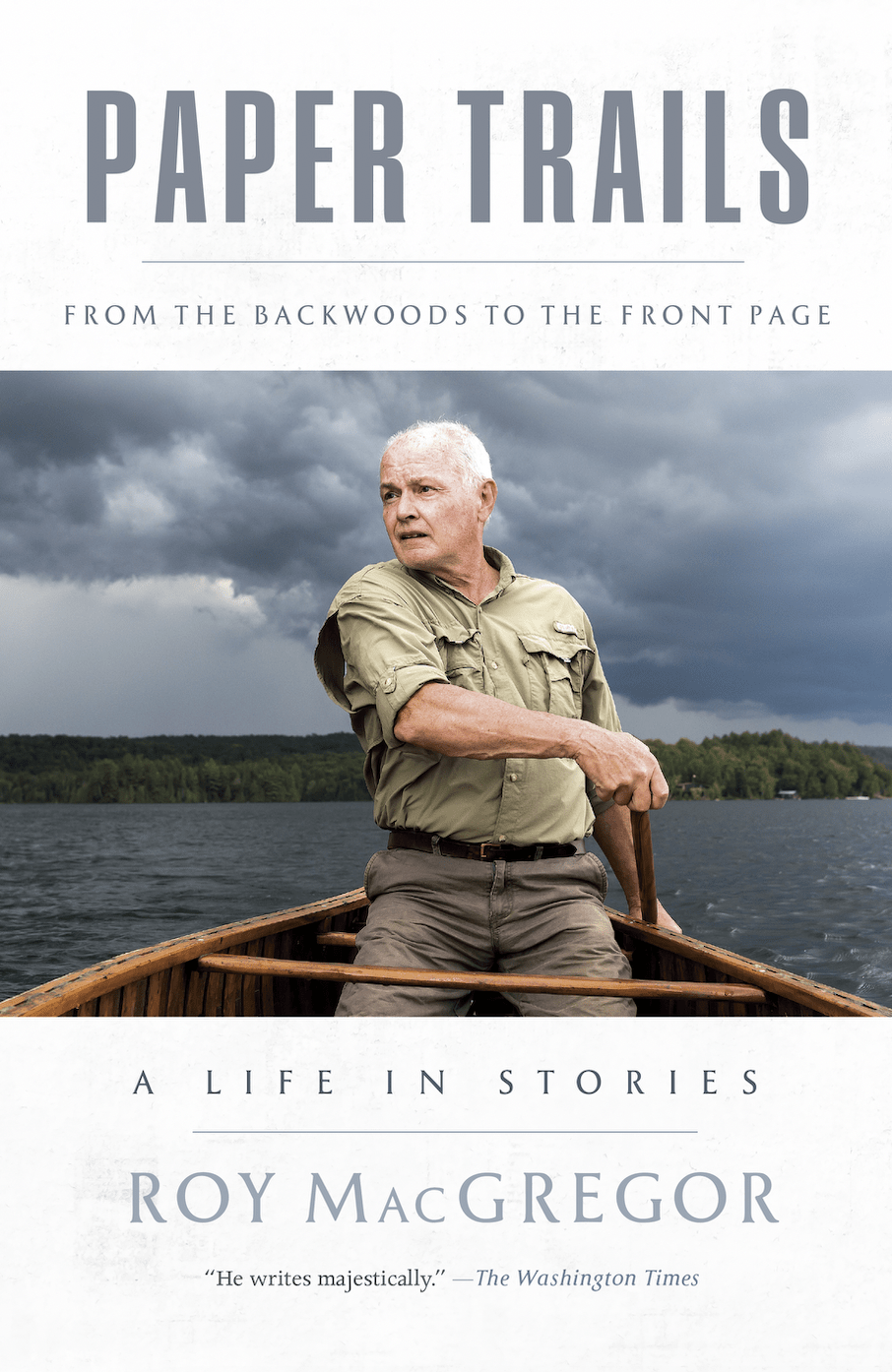‘Paper Trails’: Roy MacGregor’s Quintessentially Canadian Memoir

Paper Trails: From the Backwoods to the Front Page, a Life in Stories
By Roy MacGregor
Penguin Random House/August 2023
Reviewed by Anthony Wilson-Smith
August 1, 2023
In the ongoing, remarkable life and career of Roy MacGregor, the man’s most defining quality may be his ability to seem at home no matter what the situation. Put him in any small town in Canada, and Roy’s voice – still touched with the twang and occasional dropped g’s of his Huntsville, Ontario roots – immediately tells locals they are with one of their own. Send him, at the other extreme, for private sessions with prime ministers Jean Chrétien or Stephen Harper and he is equally at ease. Roy is also the person you want at your table in any social situation: not only does he tell the best stories, he’s equally keen to listen to those of everyone else.
Above all, MacGregor — from his reverence for nature to his lifelong infatuation with hockey to that canoe in the cover shot — is so quintessentially Canadian, it’s impossible to imagine a version of him existing elsewhere. The notion of a French, British or Mexican Roy MacGregor doppelgänger is simply impossible to conjure.
Those qualities – and more – are evident in the latest of MacGregor’s many books. His new memoir, Paper Trails: From the Backwoods to the Front Page, vividly demonstrates how he has held his place as one of Canada’s greatest journalists and best-liked practitioners for more than 50 years. Blunt in spots, lighthearted and self-deprecating, the book reflects the author’s deep love for country and chosen field of journalism, even as he is clear-eyed about past and present challenges in both.
It is arguably easier to list topics Roy hasn’t covered rather than those he has. His honours include membership in the Order of Canada and the Hockey Hall of Fame (print category) along with a string of journalism awards. Now in his mid-70s, he has worked for virtually every major publication in Canada, written a series of best-selling books, novels and television screenplays, and still weighs in with occasional columns for The Globe and Mail. Much of that, he suggests, is due to what a childhood friend called ‘MacGregor luck’ – but as the old saw goes, you have to be good to be lucky.
Blunt in spots, lighthearted and self-deprecating, the book reflects the author’s deep love for country and chosen field of journalism, even as he is clear-eyed about past and present challenges in both.
Born in 1948 to a close-knit family of very modest means, Roy’s path through life has intersected with dramatically changing times as well as some of this country’s most eminent achievers. As a child, he played hockey against Bobby Orr; as an adult, his highlights have included a spontaneous limousine tour of Saskatoon offered up by Gordie Howe; and discussing the future of Canada separately with venerated authors Hugh MacLennan and Robertson Davies as well as The Vancouver Sun’s Bruce Hutchison, the preeminent journalist of his day. MacLennan, Davies and Hutchison, all of whom wrote compellingly about Canada in their peak years, seemed, MacGregor writes, like residents of “the land of Grumpy Old Men” in their despair about the state of the country by the time he sat down with each in their final years.
One quality that shines through the book, and all Roy’s writing, is the way in which his upbringing has influenced his overall outlook. Soft-spoken and low-key in manner, he also has a steely side that was forged in the sometimes mean streets of the Muskoka cottage-country capital where he grew up. That last quality has served him well in difficult situations – whether in standing up to editors pressuring him to take directions with which he wasn’t comfortable, or by taking stands as a columnist that ran counter to prevailing views. His reporting on the early 1990s Spicer Commission on national unity so infuriated then-prime minister Brian Mulroney’s staff that they wrote internal memos discussing ways to counter his columns.
Alongside the reminiscences about people and events of national import, the most touching sections of Paper Trails are those in which he writes about family – particularly his wife and childhood sweetheart Ellen, who died in 2021 at the height of the COVID pandemic. Her imposed isolation at the hospital meant he could not be with her at the end; instead, they communicated by Facetime. MacGregor writes of how, upon being told of her passing, he took off the wedding ring she’d given him 49 years earlier and read its inscription again: ‘You and me, buds forever.’
That sentiment also applies to MacGregor’s attitude toward the country he knows so well at all levels. Unlike those ‘grumpy old men’ of earlier reference, he remains an optimist in his later years. “Canada”, he writes after describing his encounters with MacLennan, Davies and Hutchison, “is the bumblebee of nations.” By that, he means that the country still navigates forward even as few people understand how it, like the bee, can do so. The answer, he suggests, is that “Canadians have a curious way or working things out, even when everything seems to be flying in opposite directions.” The book is chock-full of such examples. In difficult present times, he gives us not only the lessons of a life well-lived, but also, with his reminders of challenging past events that we surmounted, renewed hope for the future.
Contributing Writer Anthony Wilson-Smith, President and CEO of Historica Canada, is a former editor-in-chief of Maclean’s.
